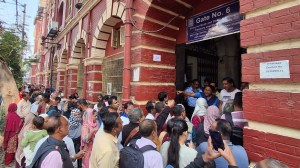‘Then you will find your doubts and your self melt away’
This morning, like every year, a small community will come together in Hridya Kunj at Sabarmati and at Bapu Kuti...

This morning, like every year, a small community will come together in Hridya Kunj at Sabarmati and at Bapu Kuti in Wardha to pray. The prayer would be an all-religion prayer meeting as conceived by Bapu, the founder of these two ashrams. They would notice that their numbers have dwindled even further, that the few newcomers have worn khadi, but it is not made from the yarn that they spun for themselves. They would ask themselves about the meaning of Bapu’s birthday in India today. What should they should celebrate? Jammu and Kashmir? Bombs that ripped through hospitals in Ahmedabad? Singur? Koshi and Mahanadi wrecking havoc? The desecration of the Wondrous Cross? Their hearts would be hard and parched up as they sing Vaishnav Jan To; would that hymn come upon them like a shower of mercy as the poet Rabindranath promised?
Many of them would tell us stories of what it meant to be a soldier of peace at times of communal conflict or to provide succour to a Bangladeshi refugee. They might also tell us as to how the techniques of violence have changed in our times. As they speak with a little shake of head, with a slight tremor in their hands they would speak of their failures. They would speak of how khadi became a subsidised endeavour, how swadeshi became a catchphrase to sell scooters, how they watched violence spiralling out of control and how institutions that went under the name of ashrams — like the one of Asharam Bapu’s — became land-grabbing exercises. They would speak of how constructive work gave way to the modern NGO. They would confirm that the state has become the greatest source of violence and inequity. They would admit that conversations across religions have become increasingly frayed. Their sense of humour intact, they would say that it took a Munnabhai to make Gandhi fashionable. They would admit that it was they who failed Bapu. They would say this because they believe it to be so. They would say it because they know that Gandhi would have said so. Gandhi would have said that his practise of truth, non-violence and brahamacharya was imperfect. He would say, like he did in Noakhali and Bihar, that his imperfections were the cause of violence and hatred.
But these men and women will not ask us if we have failed Gandhi as an idea, as imagination and as a possibility. When a Gandhi becomes a Luddite, as he does in our times, we lose the playful innovativeness of the man and his institutions. We forget that khadi was a theory of innovation. When truth becomes catechism, it losses its catholicity, its tentativeness, it loses the sets of relations through which one arrives at truth. When Gandhi becomes synonymous with swadeshi, he gets associated with the perishing village and the tribe, certain to be doomed in the global culture and economy. But we forget that swadeshi cannot be without its corollary that is swaraj. swadeshi was about dignity and self-reliance, about keeping the village and the tribe alive not only as ancestors but as a real and simultaneous possibility. Swaraj was a theory of freedom that was both outward and inward. Swaraj required that we redeem the other so that we could be free. When we aspire for a hard state armed with stringent laws, which is able to stare the terrorist in the eye, Gandhi becomes a burden. Let us not forget that those who killed Gandhi argued that he had made the state of India effete. When we mock the invocations of ‘inner voice’ we dismiss the possibility that we as human beings are capable of truth, of compassion and recognising the good in our opponents. When we become suspicious of faith itself and wish to purge our polity to make it truly sanitised and secular, we not only see we every faithful as a potential communalist, we also foreclose the possibility that religious conflict might have its best chance of resolution in the dialogues of the faithful.
And yet, we mourn the absence of a moral force in our polity. We mourn the fact that in our identity-based politics, we are allowed to speak for an increasingly narrow group. We are at a loss to fathom how to resolve the desire for greater industrial progress with the demand of farmers that land as a way of life cannot be compensated through money. We are numbed by the violence that we perpetrate on each other. And yet we do not see Gandhi as a possibility.
The writer is a social scientist based in Ahmedabad
- 01
- 02
- 03
- 04
- 05































